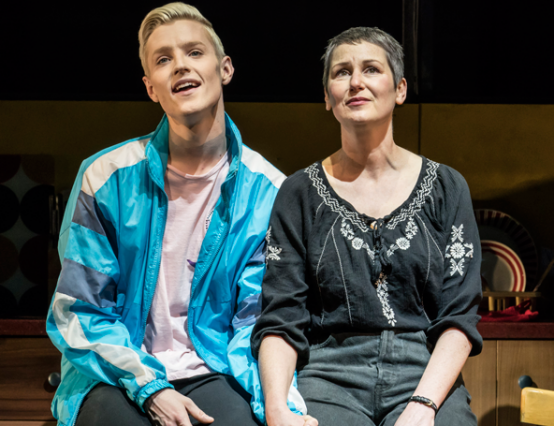Mental health is an increasing issue worldwide, amongst both young and older generations. 1 in 4 people in the UK will experience a mental health problem each year. I believe more help is needed for people dealing with mental health issues, especially now it’s becoming an increasing problem for a large portion of our population. What are we doing to support these people and how can the arts industry help?
There are a range of theatre participation opportunities for people dealing with mental health issues. Many theatre companies work with individuals in creating theatre, enabling them to experience a community and safe space to express themselves and communicate. I Am Sam, was a project which focused in on aiding people with mental health issues whilst increasing awareness of mental health; attacking the stigma behind it. This filmed project followed a drama group made up of young people who had gained some experience of mental health services. They had 8 short weeks to create a play that would be performed at 3 local schools. The project was led by The Company (a theatre charity working with local communities) in partnership with CAMHS (Child and Adolescent Mental Health Services).
Director Stephan Israel said, “The more we worked with the participants the more we learnt, and the more we understood about what a complicated issue this is”[1]. One challenge is the fact that there isn’t one way to tackle mental health and therefore can’t be one way to aid people, as everyone’s mental health is different. The ‘I Am Sam’ Project enabled participants to be free to express themselves around people who had gone through similar experiences.
Throughout the film the participants spoke to the camera about how the experience had affected them and how they didn’t feel they had received this kind of support from their schools or other services. Quotes from participants included; “It was more than just a drama class”, “we can spread a positive message about mental health and go against the stigma”, “we are able to spread our ideas and things we are passionate about”, “I’m not good at showing how I feel but through music I feel I can” and “I bottled up what was going on, now I can tell people and I know I can speak to someone” [2]. Quotes like these highlight the positive impact arts projects can have on attacking stigma and supporting people suffering from mental health issues.
As a result of the performances, a number of people in each school came forward for the first time, to ask for help with problems affecting their mental health. Overall showing the success of the project and indicating that arts projects can have a positive effect on individuals suffering from mental health issues. The work the project has done is so valid. Breaking down stigma and providing a platform to share experiences is so beneficial; arts projects, like ‘I Am Sam’, go some way to doing this.
Another example of theatre working to support people dealing with mental health is Chichester Festival Theatre’s work with The Chichester Centre, a low secure in-patient unit managed by Sussex partnership NHS foundation trust. The Theatre Skills Sessions CFT deliver aim to excite and inspire individuals, focus on development and confidence for the participants, and enable a sense of a safe group environment.
I was able to go along and see first-hand the work that CFT does with The Chichester Centre, alongside Hannah Hogg, Youth Theatre Officer at CFT, who works with the group on a weekly basis. Going to the session was really insightful, especially seeing the effect a drama workshop can have on participants dealing with mental health issues. Talking with some of the participants enabled me to learn about how beneficial they find the sessions. The atmosphere was really promising too; the participants seemed really enthused and interested with the content and interaction. Hannah told me how some of the participants have grown immensely through coming to the group. Some wouldn’t talk or engage with the session or even look up in the initial stages, now they are fully involved, sharing ideas and participating in games and activities. This progress just shows how beneficial this work can be and what a difference it can make to people’s lives.
In the light of this I spoke to a couple of the participants after the session. One of the girls said, “The group has made me feel more comfortable to express myself, it pushes me outside my comfort zone, and developed my confidence.” From speaking to her it was evident that the group provided her with a sense of belonging. The group isn’t just based on developing confidence, which could be seen as a form of theatre therapy, but the participants “always have a laugh” which is so important. The members said a huge YES when asked if they would recommend group to someone else, indicating how much the members get out of it.
Both ‘I am Sam’ and The Chichester Centre collaboration with CFT are examples of how the arts industry can support people with mental health issues. However is this a rare occurrence or are these groups the norm with in theatre organisations?
Spare Tyre are a company who create performances specifically for voiceless communities, like people living with dementia. This arts charity based in London have 40 year’s experience producing bold and powerful theatre with voiceless communities and individuals that inspires and challenges us all. Spare tyre wanted to challenge the idea that art is only for a selected few. They empower participants and artists to have ownership of the creative process, enabling personal and political fulfilment and overall wellbeing. Through fun, interactive and multisensory workshops in drama, music, film, dance, visual and digital art, they aim to give voiceless communities a renewed sense of self-esteem, confidence, independence, and a platform to have their voices heard. Taking a creative and positive approach, Spare Tyre projects provide a release for participants; a huge example of theatre aiding people dealing with mental health problems.
One of the performances that Spare tyre do is The Garden; an interactive installation and performance for people with dementia and their carers, bringing the outdoors in, the garden takes participants on a multisensory journey through the seasons. Spare Tyre artists create a safe space for communication and creative engagement, particularly focusing on methods of non-verbal communication. The Garden is person-centred, responsive to participants and bespoke to an individual’s mode of communication. The project is carefully designed to be appropriate to the physical and psychological needs of participants. I was able to attend one of the performances, and was interested to see the different responses from audience members.
One lady was really responsive and appreciated being involved. She accepted everything that was offered to her and vocally made it clear she was enjoying it. Sitting next to her I was able to really see the importance of this kind of work.
On the other end of the scale, a man who seemed very unresponsive at the start, later started walking around in the space and onto the stage. The actors dealt with the situation and altered their approach so as not to overwhelm him. They sometimes walked with him so he was not alone, they offered him things as he walked around and then sometimes just left him to wonder. This showed me that theatre can make a difference to individuals even if it’s not obvious at the start.
Overall the arts industry seems to offer many different strands of aid for people dealing with mental health issues, however often there isn’t enough awareness of what’s on offer. From my research it’s clear that the support offered is effective, but it is important that we ensure that more people have access to it.
However is enough support available for people working within the arts industry? Research has found that performing arts workers are 10 times more likely to experience mental health issues than members of the general population, illustrating that the arts and theatre industry has the most amount of people who suffer from mental health over any other career. Low pay and unsociable working hours, isolation and self-esteem struggles, all contribute to mental health problems. Are we talking about this problem enough? Has the stigma grown? If arts organisations are offering so much support for people in their communities, why is there so little support for those who work within the sector?
Mental health problems can be due to the lifestyle that goes hand in hand with a career in the arts. Individuals can be prone to isolation, money problems and instability. For a performer the rejection and judgement from anybody and everyone can have an effect, sometimes leading to multiple mental health issues.
There doesn’t seem to be a support hub available for industry professionals who are struggling. The realities of the industry can bring stress and struggle for someone who has not got any mental health issue, the effect could be particularly difficult for someone who is suffering, especially without sufficient support.
There is still to a lot of stigma around this subject, to the extent that it’s really preventing people from coming forward for help. A lot of performers and artists feel that if they do come forward they are at risk of losing their job, or fear a decline in future employment. The lack of support shows the stigma is still very prominent. So where can they turn?
Having researched what arts organisations are doing it seems that there are more polices being put in place to support people dealing with mental health. It is clear that HR departments have been getting mental health training and that this is creating more of a support network within companies. However with government funding cuts in the arts becoming more frequent, will training and supporting those suffering from mental health issues be too expensive for arts organisations? One thing is clear, there needs to be change. We need to raise awareness of mental health issues being prominent within the arts industry. It needs to be spoken about more freely so that the stigma surrounding it can be stamped out.
As someone who has grown up with theatre being a huge part of my life and a passion I want to pursue, I feel there could be a real benefit in a support network through theatre organisations and the arts industry as a whole, which could impact a lot of change. Mostly we need the support for people who work in the industry. Having researched the subject I feel if more support was there, the stigma would be stripped and more people would feel comfortable in coming forward to get help.
On a whole it looks like the arts are trying to offer support and create a strong support network through theatre, which I didn’t realise was available. This still disregards the industry professionals who are looked over. While researching for this debate I found a public survey was done through The Stage Magazine. Is enough done to look after performers mental health? 9.62% voted yes, and a huge 90.38% voted no. The public are calling out, we need more support for people suffering mental health problems within the arts industry. We need change and more support could help to create that change
[1] Stephan Israel – I Am Sam Video.
[2] Participants – I Am Sam Video.









The whole of the arts in general can be incredibly beneficial for people with mental health problems. We can even save lives!